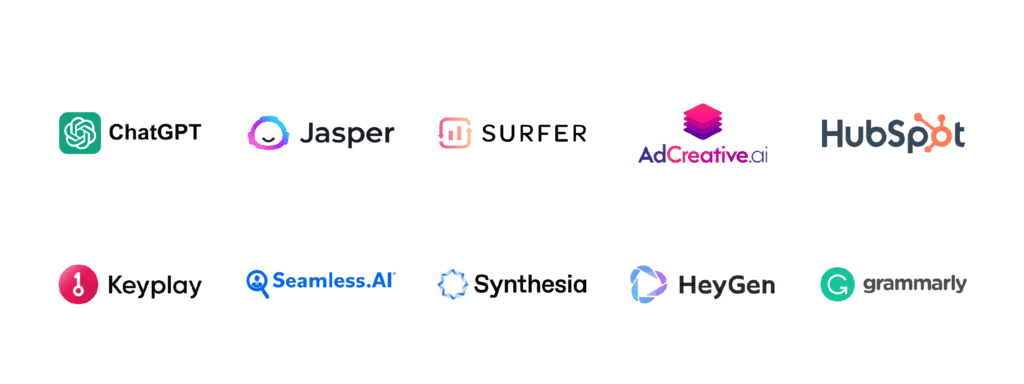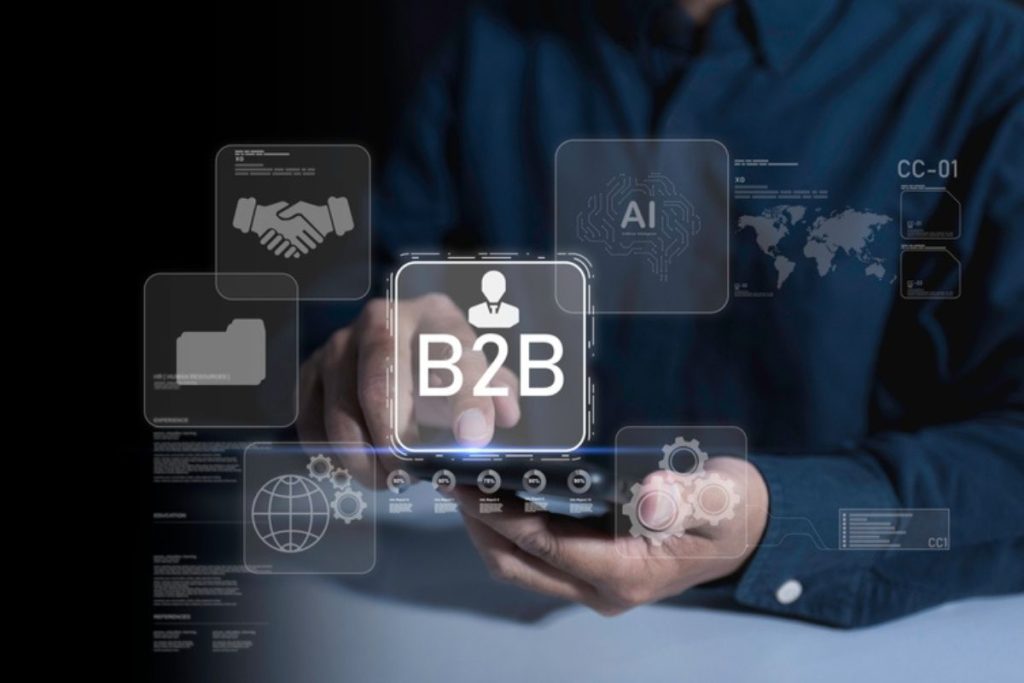How AI Automation For B2B reduces costs while improving efficiency
Wiki Article
AI Automation for B2B: Techniques to Boost Your Business Efficiency
AI automation in the B2B field provides a pivotal chance for organizations to improve their efficiency. By enhancing and simplifying procedures decision-making, businesses can attain considerable efficiencies. Nevertheless, the effective integration of AI calls for careful factor to consider of numerous variables. Comprehending which areas to automate and choosing suitable devices are simply the beginning. The possibility for makeover elevates vital concerns concerning implementation and ongoing examination. What approaches will guarantee long lasting success in this progressing landscape?Recognizing AI Automation in B2B Context
As businesses increasingly seek effectiveness and innovation, understanding AI automation in the B2B context ends up being crucial. AI automation leverages innovative modern technologies to streamline procedures, enhance decision-making, and improve overall efficiency. By integrating AI tools, companies can maximize operations such as supply chain monitoring, customer connection administration, and data evaluation. These modern technologies can evaluate vast quantities of data rapidly, giving actionable understandings that drive critical efforts. Furthermore, AI-driven automation minimizes human mistake and releases up staff members to concentrate on more complex tasks. By fostering cooperation in between human intelligence and equipment abilities, organizations can attain an affordable edge. Eventually, understanding AI automation is vital for B2B companies aiming to prosper in a significantly digital marketplace.Identifying Locations for Automation
In the mission for reliable AI automation in B2B, it is important to identify certain areas where automation can generate considerable advantages. This includes evaluating job repetitiveness, checking out chances for information processing, and determining process bottlenecks. By concentrating on these facets, companies can streamline procedures and enhance productivity.Job Monotone Assessment
Job repetitiveness analysis plays a necessary role in recognizing areas ripe for automation within B2B procedures. This procedure includes assessing everyday jobs to determine which are repeated and taxing, therefore impeding efficiency. By inspecting workflows, companies can determine particular features that require too much manual input, such as data entrance, billing processing, or customer follow-ups. Acknowledging these repeated jobs allows organizations to designate sources more successfully, boosting total efficiency (AI Automation For B2B). In addition, automation can decrease human mistake, streamline operations, and liberate workers to focus on higher-value tasks. Performing a thorough task repetitiveness analysis empowers B2B companies to adopt targeted automation methods, inevitably driving improved performance and affordable benefit in the industryInformation Handling Opportunities
Countless information handling chances exist within B2B organizations, presenting significant possibility for automation. These possibilities commonly emerge in locations such as information access, billing processing, and client connection administration. By automating data collection and recognition procedures, companies can decrease human mistake and enhance efficiency. In addition, automating record generation permits teams to access real-time understandings, cultivating prompt decision-making. Stock management systems can additionally gain from automation, enhancing stock monitoring and order handling. Additionally, leveraging AI in data analytics allows services to discover trends and patterns that might otherwise go unnoticed. Eventually, embracing automation in these locations not only maximizes operations yet likewise liberates beneficial resources, permitting staff members to concentrate on critical efforts that drive development.Process Traffic Jam Identification
Identifying process traffic jams is a crucial step in understanding the full advantages of automation within B2B organizations. These traffic jams typically materialize as delays, resource restraints, or inefficient procedures that hinder efficiency. To effectively identify these locations, businesses can perform complete evaluations of their workflows, using metrics such as cycle time and throughput. Involving employees in conversations concerning pain points can likewise supply beneficial insights. As soon as bottlenecks are recognized, companies can prioritize them based on effect and usefulness for automation. By purposefully resolving these inadequacies, B2B firms can simplify operations, enhance partnership, and inevitably improve general efficiency. This aggressive approach to workflow analysis lays the groundwork for effective automation initiatives that drive service development.Selecting the Right AI Equipment and Technologies
As organizations significantly transform to AI to boost their procedures, selecting the right tools and technologies becomes necessary for accomplishing preferred results. Organizations needs to review their specific demands and purposes, considering aspects such as scalability, compatibility, and user-friendliness. An extensive market evaluation can aid recognize leading AI remedies customized for their market. In addition, businesses should assess the technical facilities required to sustain these devices, making sure seamless combination with existing systems. Data safety and security and compliance with policies are additionally important considerations that influence tool option. By focusing on these requirements, business can make informed choices that drive efficiency and performance, inevitably resulting in improved company performance. The appropriate AI tools equip organizations to introduce and maintain an one-upmanship in the market.Developing a Tactical Application Strategy
A successful calculated application prepare for AI automation in B2B calls for clearly defined essential goals. B2B Automation Consulting. Furthermore, organizations should evaluate their present abilities to recognize spaces and opportunities for improvement. Continuous surveillance and change of the approach will certainly guarantee alignment with progressing service demands and modern technology innovationsSpecify Key Goals
To ensure successful AI automation in B2B environments, specifying essential objectives is important for creating a tactical execution plan. Organizations should identify certain, quantifiable goals that straighten with their overall business method. This clarity supplies a roadmap for the automation procedure, ensuring that efforts are concentrated on areas that will generate the highest possible impact. Trick goals might consist of enhancing functional performance, enhancing client contentment, or enhancing earnings. Setting these purposes enables teams to focus on sources efficiently and track development in time. Additionally, clear goals help with better interaction amongst stakeholders, promoting partnership and placement throughout the company. Eventually, well-defined goals work as the structure for a durable AI automation strategy that drives company performance.
Examine Existing Capacities

Display and Change
Carrying out AI automation requires a vibrant technique that highlights continual tracking and adjustment - B2B Automation Consulting. Services need to create a tactical implementation plan that incorporates routine examinations of AI performance versus predefined metrics. This involves tracking key performance indicators (KPIs) to examine the performance of automation options. By examining information, organizations can identify areas for enhancement and adjust their AI systems appropriately. Engaging with recommended you read stakeholders throughout the process guarantees that the automation lines up with business purposes and individual demands. Furthermore, promoting a society of adaptability allows firms to respond promptly to transforming market conditions and technical advancements. Ultimately, recurring surveillance and modification not only enhance functional efficiency however also drive continual company efficiency in the affordable B2B landscapeEnsuring Data Top Quality and Combination
As organizations significantly depend on AI automation in B2B processes, ensuring information quality and integration comes to be essential for success. Premium data is essential for precise analytics, informed decision-making, and effective customer involvement. Information have to be cleaned, standard, and validated to remove errors and inconsistencies that might lead to illinformed insights. In addition, seamless combination across numerous systems and systems is imperative; inconsonant data silos impede automation initiatives and decrease functional efficiency. Organizations ought to take on durable data administration frameworks and make use of sophisticated devices to facilitate data combination while maintaining quality requirements. By focusing on these components, companies can boost their AI automation campaigns, eventually resulting in enhanced efficiency and an affordable advantage in the B2B landscape.Determining Success and ROI of AI Initiatives
Just how can companies effectively gauge the success and roi (ROI) of their AI efforts? To determine performance, organizations should establish clear, quantifiable objectives aligned with tactical objectives. Secret efficiency signs (KPIs) such as expense financial savings, income growth, and productivity improvements can supply beneficial understandings. Organizations often conduct standard analyses prior to implementing AI, allowing them to compare pre- and post-implementation metrics. Furthermore, examining customer fulfillment and interaction can expose the impact of AI on customer experience. Regularly reviewing these metrics helps in refining AI approaches and making sure alignment with business objectives. By utilizing a structured approach to dimension and examination, companies can accurately evaluate the performance of their AI efforts and make educated choices regarding future investments.Getting Over Obstacles in AI Adoption

Regularly Asked Questions
How Can AI Automation Improve Client Connection Management in B2B?
AI automation can boost consumer partnership administration in B2B by simplifying communication, supplying individualized interactions, evaluating client data for insights, automating follow-ups, and boosting action times, eventually promoting more powerful relationships and driving sales growth.What Industries Benefit The Majority Of From AI Automation in B2B?
Production, finance, healthcare, and logistics industries profit most from AI automation in B2B. These markets utilize automation to enhance procedures, enhance information analysis, enhance consumer communications, and eventually increase operational efficiency and earnings.Exactly How Does AI Automation Influence Staff Member Roles in B2B Companies?
AI automation changes employee duties in B2B business by streamlining jobs, minimizing recurring work, and allowing team to concentrate on critical initiatives. This change boosts productivity and promotes a culture of advancement and versatility.What Are the Prices Related To Applying AI Automation?
The prices connected with applying AI automation include initial software program procurement, framework upgrades, training costs, ongoing upkeep, and potential combination obstacles. Minarik AI. Companies need to likewise think about long-lasting functional shifts and employee adjustment expenses in their financial planningHow Can Businesses Make Sure Honest AI Usage in Their Procedures?
Companies can assure moral AI usage by developing clear standards, advertising openness, carrying out regular audits, involving varied stakeholders, and focusing on information personal privacy. Continual training and understanding programs additionally boost understanding and adherence to ethical practices.As services progressively look for effectiveness and technology, understanding AI automation in the B2B context comes to be important. In the mission for reliable AI automation in B2B, it is crucial to identify particular areas where automation can produce considerable advantages. An effective calculated application plan for AI automation in B2B calls for clearly defined vital goals. To guarantee effective AI automation in B2B settings, defining key goals is important for establishing a strategic implementation strategy. As companies significantly count on AI automation in B2B procedures, making certain information quality and assimilation ends up being vital for success.
Report this wiki page